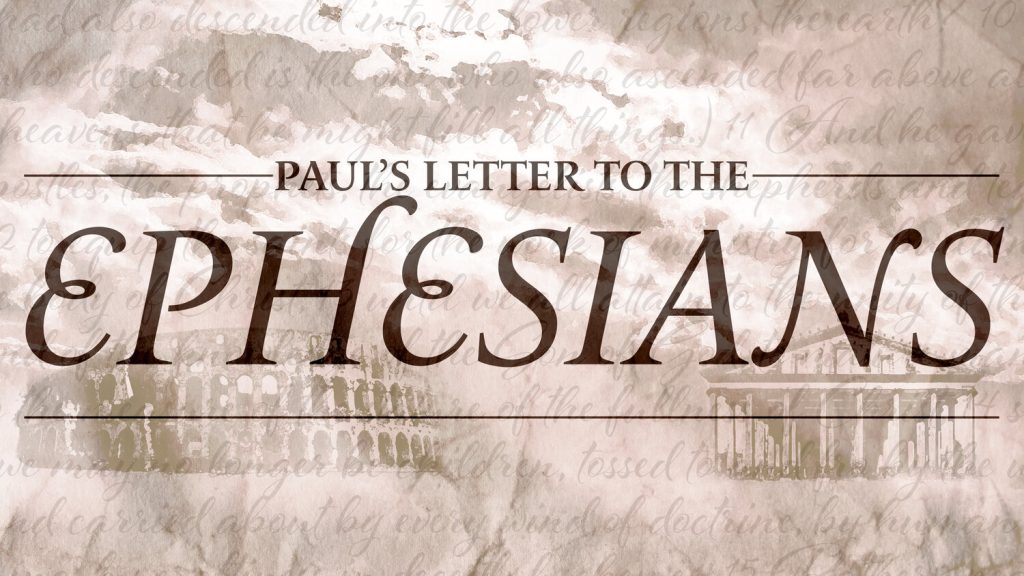The Lord willing and if tropical system Debby is not a threat, we will begin our reading of Ephesians this Tuesday. If you have time this weekend, please read through the entirety of the letter so that you can have a better sense of its overall structure and purpose. I have attached a brief overview of the letter from Luke Timothy Johnson’s The Writings of The New Testament. For background, I am using commentaries from N.T. Wright and Ben Witherington. All you will need for this study is a bible.
Date and Authorship:
This letter is generally considered to have been written by Paul during his captivity in Rome when he also wrote Philippians, Colossians, and Philemon. But this is a different type of letter and is not typical of Paul’s other correspondence. Therefore some scholars question Paul’s authorship. For example, unlike Paul’s other letters, Ephesians does not address any particular problem in the congregation. Also, although Paul spent at least two years in Ephesus (Acts 19:10) he does not mention any specific person in the congregation and, according to Ephesians 1:15, does not appear to know the congregation at all.
The work may also not actually be a letter. Only the brief two-verse greeting in the beginning and the short four-verse salutation at the end (which mirrors Colossians 4:7-8) indicate that this may be a letter. Adding to the intrigue is that some of the early copies of this work do not mention “Ephesus” and that, at least one early Christian (heretic) (maybe), knew of this letter as the “Letter to the Laodicea” mentioned in Colossians 4:16.
Most likely, Ephesians is not a specific letter to a particular congregation, but an encyclical or general letter to be circulated and read in a series of churches.
Themes:
The great theme of Ephesians is reconciliation – vertically, horizontally, and personally. Ephesians is the reminder to its audience of (i) how Christ has reconciled all creation to himself and to God, (ii) how through Christ, all of humanity is reconciled to each other by and through the church, and (iii) how we in the church are to live a reconciled life. Paul carries out this theme, not through argumentation or proof texts, but primarily by praise and thanksgiving for who Jesus Christ is and what he has done through his Passion and Resurrection. Just as Philippians emphasized rejoicing, so here Paul emphasizes our living into the glory of who Christ is through the community of believers.
Paul’s Apocalyptic Vision:
Paul’s themes of reconciliation take place within a deeply apocalyptic understanding of Christ’s Passion and Resurrection. As we read through Ephesians, notice how Paul’s teaching is based on Christ’s victory over the unseen heavenly realms ruled by powers and spirits of disobedience, wickedness, and darkness. Ephesians may lack the extravagant imagery of John’s Revelation, but its understanding of the cosmos we inhabit, who Jesus is, and what Jesus did, is almost identical.
In his book Atheist Delusions, David Bently Hart puts forth Paul’s apocalyptic vision thusly: “In its fallen state, the cosmos lies under the reign of evil (Eph. 6:12, 1 John 5:19), but Christ came to save the world, to lead “captivity captive” (Eph. 4:8), and to overthrow the empire of those “thrones, dominions, principalities, and powers” (Col. 1:16, 1 Cor. 2:8, Eph. 1:21, 3:10, Gal. 1:4) and “rulers on high” (Eph. 6:12) that have imprisoned creation in corruption and evil. . . . It was from the tyranny of these powers on high that Christ had come to set creation free. And so the life of faith was, for the early church, before else, spiritual warfare, waged between the Kingdom of God and the kingdom of this fallen world, and every Christian on the day of his or her baptism had been conscripted into that struggle on the side of Christ.”
Dinner is at 6. Discussion about 6:45. Compline at 8. Hope to see you here!
This grace was given to me, to preach to the Gentiles the unsearchable riches of Christ, and to make all men see the administration of the mystery which for ages has been hidden in God who created all things; so that the manifold wisdom of God might now be made known through the church to the rulers and the authorities in the heavenly places. Ephesians 3:8b-10


Pingback: Ephesians 4:1-7, A Life Worthy of Our Calling – Ancient Anglican
Pingback: Ephesians 4:7-14, Christ’s Spiritual Gifts – Ancient Anglican